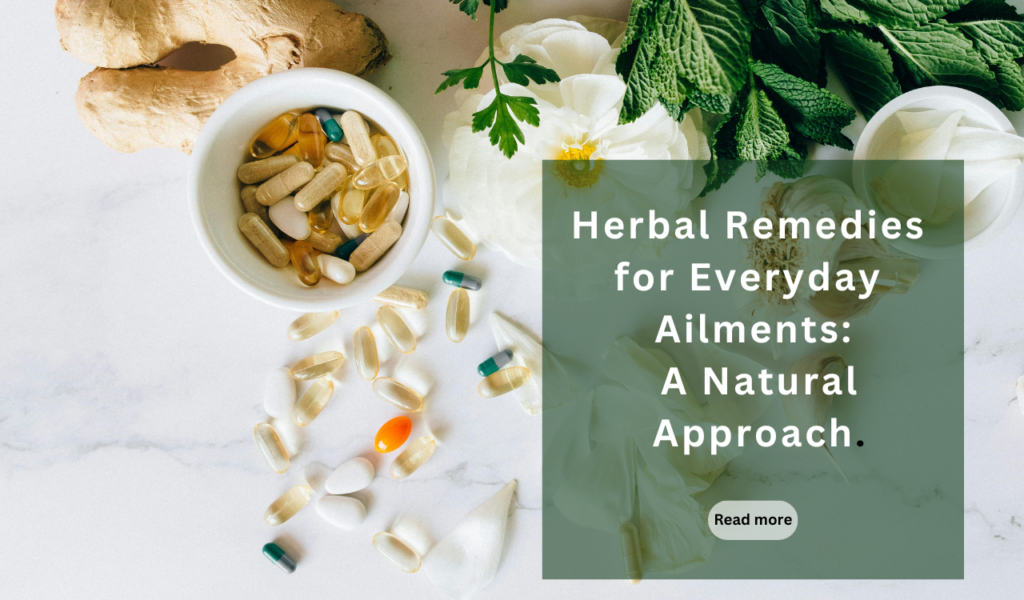Significance of understanding and using herbal remedies safely.
Significance of understanding and using herbal remedies safely. In recent times, there has been a pronounced increase in interest in natural remedies, due to a growing desire for holistic and precautionary approaches to health. Numerous people are turning to herbal remedies as a way to manage everyday ailments and enhance overall health, developed with the pledge of smaller side goods and a more holistic approach to health. still, it’s very important to approach herbal remedies with informed caution. Understanding how herbs work, knowing the proper dose, and fetching implicit relations with specifics are essential for safe and effective use. By educating ourselves about these natural options, we can reap their benefits while minimizing pitfalls and ensuring a balanced approach to our health.
The literal benefits and advantages over pharmaceutical options of herbal remedies.
Herbal remedies have been an integral part of mortal health care for thousands of times, dating back to ancient societies similar to the Egyptians, Greeks, and Chinese. Historically, these remedies were the primary means of treating complaints and maintaining health before the arrival of ultramodern medicines. Knowledge of herbal drugs was passed down from generation to generation, frequently recorded in ancient textbooks and rehearsed by traditional healers.
One of the primary benefits of herbal remedies is their holistic nature. Unlike pharmaceutical medicines, which frequently target specific symptoms or conditions, numerous herbs work on multiple situations within the body, addressing root causes and promoting overall balance. This integrative approach can lead to further holistic health benefits and better health.
Herbal remedies also offer several advantages over traditional pharmaceutical options. They frequently come with smaller side goods, as they use natural composites that the body can reuse more fluently. also, numerous herbs contain a complex admixture of active composites that work synergistically, potentially enhancing their remedial goods and reducing the liability of adverse responses. Likewise, the use of herbal remedies can promote a more sustainable and less chemical reliance for health care, in line with the growing preference for natural and environmentally friendly results.
Herbal Remedies for Common Ailments.
Herbal remedies have been used for centuries to treat common affections, offering natural druthers to conventional drug. For illustration, ginger is known for its anti-inflammatory characteristics and can help relieve nausea and digestive problems. Peppermint tea is frequently used to relieve worried tummies and headaches, while chamomile is celebrated for its comforting goods and capability to prop sleep. Echinacea is frequently taken to boost the vulnerable system and conceivably dock the duration of snap. Although these treatments can be salutary, it’s important to use them with caution and consult a healthcare provider, especially if you have underlining health conditions or taking other specifics.
Herbal Remedies for the digestive system.
Indigestion and heartburn:
Chamomile Calms digestion, reduces inflammation, and can help relax abdominal muscles.
Ginger: Stimulates digestive juices, helps with nausea, and reduces bloating and gas.
Fennel Relieves bloating and gas promotes digestion and has antispasmodic characteristics that ease discomfort.
Constipation:
Psyllium: A natural source of soluble fiber that helps soften stool and promotes regular bowel movements.
Flaxseed is Rich in fiber and omega-3 fatty acids, it helps soften stools and support gut health.
Senna: A natural laxative that stimulates bowel movements. Best used short-term due to possible dependence.
Diarrhea:
Peppermint has antispasmodic effects that can help relieve pain and discomfort associated with diarrhea.
Marshmallow root soothes the mucous membranes of the digestive system and can help reduce inflammation and aggravation.
Blackberry Leaf contains tannins that help strain tissues and reduce diarrhea.
Nausea and motion sickness:
Ginger is effective for reducing nausea and perfecting digestion, Generally used for stirring sickness and morning sickness.
Peppermint helps relax stomach muscles and relieve nausea and is also useful for stir sickness.
Formed ginger can be masticated to snappily relieve nausea, especially useful for trip or gestation-related symptoms.
Gas and bloating:
Caraway seeds May help reduce bloating and gas; They also improve digestion and relieve stomach discomfort.
Cumin Aids digestion reduces bloating and can help with gas and indigestion.
Fennel, has carminative parcels that help expel gas and reduce bloating.
Stomach ulcers:
Licorice root contains composites that help soothe and cover the filling of the stomach. DGL( deglycyrrhizinated licorice) is frequently specified to avoid possible side effects.
Slippery elm creates a soothing laxative that protects the lining of the stomach and helps heal ulcers.
Marshmallow root coats and soothes digestion, and promotes healing of the stomach lining.
General digestive health:
Dandelion Root Acts as a mild diuretic stimulates appetite and supports liver health, which in turn aids digestion.
Artichoke Leaf Promotes corrosiveness product and supports liver and gallbladder function, enhancing overall digestion.
Coriander Aids digestion and relieves symptoms of gas and bloating.
Herbal remedy for the respiratory system.
Herbal remedies can be a gentle but effective way to manage stress and anxiety. Adaptogens like ashwagandha are known for their capability to help the body adjust to stress and reduce cortisol levels, while valerian root is frequently used to promote relaxation and better sleep quality. Chamomile, generally consumed as a tea, has calming tracts that relieve anxiety and induce a sense of calm. also, passion flowers can help reduce anxiety symptoms by promoting relaxation. These herbs offer a natural approach to stress operation, although they should be used as part of a broader strategy for internal health and should be consulted with a healthcare provider for substantiated advice.
Herbal remedy for Stress and Anxiety.
Herbal remedies can be a gentle but effective way to manage stress and anxiety. Adaptogens like ashwagandha are known for their capability to help the body adjust to stress and reduce cortisol situations, while valerian root is frequently used to promote relaxation and better sleep quality. Chamomile, generally consumed as a tea, has calming tracts that relieve anxiety and induce a sense of calm. also, passionflower can help reduce anxiety symptoms by promoting relaxation. These herbs offer a natural approach to stress operation, although they should be used as part of a broader strategy for internal health and should be consulted with a healthcare provider for substantiated advice.
Herbal remedy for joint and muscle pain.
Herbal remedies can give relief from joint and muscle pain through their anti-inflammatory and analgesic parcels. Turmeric, along with its active emulsion curcumin, is well-regarded for reducing inflammation and relieving common pain. Willow bark contains salicin, which has aspirin-suchlike pain relieving parcels, making it useful in treating muscle pain. Arnica frequently used topically in gels or ointments, can help reduce soreness and pain. Also, ginger is known for its ability to reduce pain and stiffness associated with arthritis. Although these herbs may give characteristic relief, they should complement, not substitute, conventional treatment, and it’s reasonable to consult a healthcare provider for a holistic approach.
Encouragement to explore and integrate herbs into daily life.
Exploring and integrating herbs into daily life can be salutary in enhancing health and espousing natural health practices. Herbs offer numerous benefits, from supporting digestion and boosting impunity to reducing stress and perfecting sleep. Incorporating herbs into your regular routine whether through teas, supplements, or cooking can give gentle, holistic support for your body and mind. Experimenting with different herbs and learning about their goods can be both pleasurable and educational. As you explore these natural remedies, flashback to consult with a healthcare provider to ensure the round your overall health strategy and incorporate them safely into your life.



